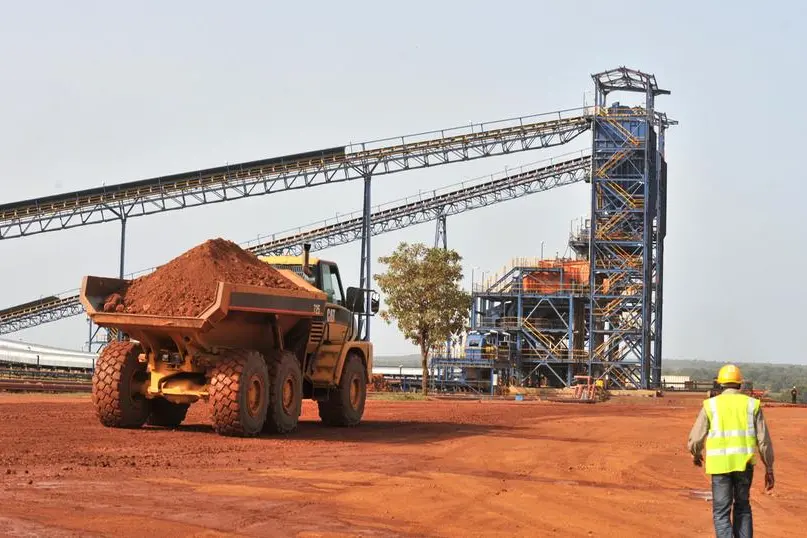
Staff Writer, Agence France-Presse (AFP)

Huge deposits of natural resources — including oil, gas and gold — have pushed the economy of the world’s biggest cocoa producer in a new direction
Ivory Coast’s mining industry is booming, driven by foreign investment and the discovery of new deposits, but the country now wants a bigger slice of the pie for its own businesses.
Huge deposits of natural resources — including oil, gas and gold — have pushed the economy of the world’s biggest cocoa producer in a new direction.
Three discoveries of oil and gas have been made since 2021 and gold production last year was four times higher than a decade earlier.
The West African country’s bedrock also contains iron, diamonds, nickel, manganese, bauxite, copper and newly discovered reserves of coltan — a precious ore used to make electronic devices.
Ivory Coast has offered attractive conditions to bring in foreign investors. Now, a revision of the mining code due in the coming weeks will target homegrown investment.
Current laws introduced in 2014 “facilitated the arrival of many investors” by extending permits and creating a land register for greater transparency, director general of mines Seydou Coulibaly said.
Few details about what will be in the revised mining code are known.
But it is expected to focus on local businesses and communities, Coulibaly added, in order to boost the national economy.
Mining Minister Mamadou Sangafowa Coulibaly has urged experts drawing up the text to include measures to “ensure fairness in the distribution of the wealth, once the discovery has been made”.
– Ten-year boom –
“The new code will be more attractive and the means are being put in place to ensure that operations also benefit Ivorians, particularly by involving national banks, without discouraging international investors,” said specialist Cedric Sehe, who heads mining promotion firm CAMP2E.
It comes at a time when the military juntas in Mali, Burkina Faso and Niger are taking steps to reclaim mining resources from foreign companies operating in the Sahelian countries.
In Ivory Coast over the last 10 years, discoveries of hydrocarbons and minerals have multiplied, production has grown and resources have diversified.
The number of mining permits has roughly tripled to 29, while exploration permits have increased from 140 to 189.
Gold production shot up from 13 to 51 tonnes between 2012 and 2023.
The mining sector now accounts for four percent of Ivory Coast’s gross domestic product, compared to just 1.5 percent a decade ago, according to the Professional Association of Miners of Ivory Coast (GPMCI).
Likewise, tax revenue from mining has ballooned to 250 billion CFA francs ($399,500, 381 million euros) — a 20-fold increase over the same period.
Total investment in Ivorian mines was estimated to be more than 500 billion CFA francs last year.
– Prioritising Ivorians –
Ivorian authorities already sought to “promote and develop” local extractive companies under a 2022 law.
However, it only applied to oil and gas activities.
Under the legislation, Ivorian firms should already get priority in public tenders and certain activities must be carried out only by them.
They include “slickline” operations, where a cable is used to lower tools into oil wells, said Erus Djimo from Ivorian company Hydrodrill, which operates two oil and gas sites.
Speaking at the International Extractive and Energy Resources Exhibition in the main city, Abidjan, last month, he said the technique required technology “within the reach of local companies”.
The exhibition organised by the government was a first, and brought together local businesses and foreign heavyweights such as Italian giant Eni and Canada’s Endeavour Mining.
– Lack of finance –
The 2022 law encouraged oil and gas industry companies “to recruit and employ Ivorian nationals as a matter of priority” and train local workers.
Sangafowa Coulibaly, the mining minister, in May also announced the creation of a digital platform dedicated to the local sector to ease administrative procedures including licence applications and renewals and provide access for hydrocarbons tenders.
Local business manager Faustin N’Dri N’Guessan welcomed the shift towards helping Ivorian companies reap bigger profits.
The new policy is an “opportunity to grow”, said N’Guessan, from the infrastructure manufacturing and maintenance company Kuyo Pipeline.
But “we do not really have financial backing”, he complained, adding that the state needed to “understand that funds must be created” as investment currently comes from abroad or private initiatives.
In a step towards addressing that need, the GPMCI professional miners’ association announced last month that it would set up an investment fund to support local businesses and training.
